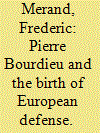|
|
|
Sort Order |
|
|
|
Items / Page
|
|
|
|
|
|
|
| Srl | Item |
| 1 |
ID:
141447


|
|
|
|
|
| Summary/Abstract |
The Organization for Security and Cooperation in Europe (OSCE) is perhaps the world's least-known major security organization. However, the same characteristic which puts the OSCE seemingly continually on the verge of irrelevance with respect to the other actors in European and global security is in fact what has allowed it to endure and is in fact its greatest asset. That is, the OSCE's distinct combination of modern and postmodern characteristics in both its composition and its activities allows it to create what can be called “embedded security”. Tracing the evolution of one particular set of decision-making rules embedded within a normative framework which questioned the fundamental meanings of “security”, and exploring present-day activities, this article reinterprets the OSCE in the light of this new model. In so doing, it re-contextualizes both the OSCE's origins and its contemporary relevance. Instead of a modernist, functional, rule-driven interpretation which situates the OSCE on the periphery in a crowded field, this explanation puts the OSCE at the centre of the postmodern and normative European security architecture.
|
|
|
|
|
|
|
|
|
|
|
|
|
|
|
|
| 2 |
ID:
097373


|
|
|
|
|
| Publication |
2010.
|
| Summary/Abstract |
This paper uses an analytical framework derived from Pierre Bourdieu's sociology to explain the genesis of the European Security and Defense Policy (ESDP). Long-term social and institutional processes at work in the making of ESDP are addressed through an emphasis on the institutionalization of social fields, the impact of structural crises, and the socialization of policy makers into specific schemes of perception and action (habitus). Two arguments follow from this framework. First, the paper shows that the creation of ESDP after 1998 would have been impossible without the prior institutionalization of two transgovernmental arenas: (1) the European foreign policy field, wherein EU diplomats vie for influence over EU policies; and (2) the international defense field, centered upon military relations within NATO. Second, ESDP results from the strategies of a number of diplomats and military leaders who, following the end of the Cold War, perceived that they faced important organizational crises in their respective fields. This sociological framework provides a more nuanced account of ESDP's creation than that proposed by the two dominant explanations in international relations theory-realism's balancing and constructivism's strategic culture convergence. Combining structural and ideational factors, it elucidates three empirical puzzles: the lack of opposition to ESDP when it was launched, the motives of policy makers who proposed ESDP, and the disappearance of alternative options for the European security architecture.
|
|
|
|
|
|
|
|
|
|
|
|
|
|
|
|
| 3 |
ID:
129818


|
|
|
|
|
| Publication |
2014.
|
| Summary/Abstract |
On 5 June 2008, then Russian President Dmitry Medvedev proposed a new European security architecture. Medvedev suggested that the new security architecture could be considered a 'Helsinki Plus' treaty, an adaptation of the Helsinki Final Act to the current international state of affairs. This article examines how Russia was strategically reframing European security through its proposal for a new European security architecture, and in particular the sub-issues of how Russia was strategically framing security and European security and how this framing was an attempt to change existing formulations and perspectives on European security.
|
|
|
|
|
|
|
|
|
|
|
|
|
|
|
|
| 4 |
ID:
117361


|
|
|
|
|
| Publication |
2012.
|
| Summary/Abstract |
THE DEVELOPMENT OF mutually beneficial, equal and diversified partnership with the European Union has been, and will in the foreseeable future remain one of Russia's foreign policy priorities, as well as a guarantee of the stability of the European security architecture.
The European Union is not only our largest trade and economic partner, Russia's main energy export market and a key source of investment and technology. We are inseparably linked by millions of invisible threads of Greco-Roman and Christian cultural legacy, historical evolution, and common traditions, ideals, and moral guidelines. Russia and the EU are major international centers of force, making a significant contribution to the maintenance of global and regional security, and projecting peace, prosperity and stability to outlying regions.
|
|
|
|
|
|
|
|
|
|
|
|
|
|
|
|
|
|
|
|
|